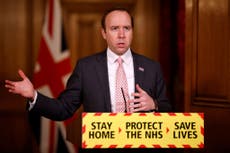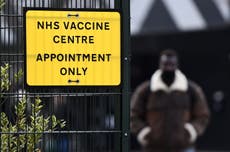Reforms without increased funding will do more damage to the NHS
The government’s proposal does not outline the resources needed to improve the health system, we need to end the profiteering from health and build a service that gives us all the care we deserve


Your support helps us to tell the story
From reproductive rights to climate change to Big Tech, The Independent is on the ground when the story is developing. Whether it's investigating the financials of Elon Musk's pro-Trump PAC or producing our latest documentary, 'The A Word', which shines a light on the American women fighting for reproductive rights, we know how important it is to parse out the facts from the messaging.
At such a critical moment in US history, we need reporters on the ground. Your donation allows us to keep sending journalists to speak to both sides of the story.
The Independent is trusted by Americans across the entire political spectrum. And unlike many other quality news outlets, we choose not to lock Americans out of our reporting and analysis with paywalls. We believe quality journalism should be available to everyone, paid for by those who can afford it.
Your support makes all the difference.The last twelve months have been traumatic for the NHS. Overwhelmed and exhausted staff have struggled to give proper care to an almost unending stream of extremely ill patients. Far too many people have lost their lives – including nurses, doctors and carers, and other people putting their lives on the line for us.
During the past year, there has been the repeated evidence that our inability to cope with the pandemic, resulting in the worst Covid-19 death rates in the world, is in large part down to the cuts, privatisation and fragmentation inflicted on the NHS and our public health systems over ten years of Tory rule. So, it should be welcome that the government is accepting this and setting out proposals they claim will fix the mess they made of our NHS.
But rather than increasing democracy, ending privatisation and improving care, as the government and media headlines might lead us to believe, these proposals either confirm changes already being implemented, failing to truly tackle the NHS’ problems, or even accelerate the processes threatening our public health service.
First up – what’s not in the proposal? There is no mention of the dramatic increase in resources we need to undo the damage of years of austerity on the NHS – not to mention the additional investment to improve care, recruit the tens of thousands of additional nurses and doctors we need, nor pay them fairly.
Right now we’re spending half of what we need to be on mental health, if we want to match investment with the burden of disease. Despite Covid-19 driving a huge increase in demand for mental health support, there is no sign of the long-promised parity of care with physical health. Any reforms without increased funding will result in continued managed decline of the care available to patients – something these changes look set to make easier.
And what about the trumpeted end to contracts going to the private sector? We should be pleased the government has accepted what we’ve been saying for years –privatisation has been accelerating and damaging the NHS since the disastrous reforms brought in under David Cameron. But ending the requirement to tender does not eliminate their role – private providers will still be hoovering up NHS funds as profits; outsourced NHS workers could be exploited by multinationals.
Many areas of the NHS, such as the growing area of digital and support services, will continue to funnel contracts to the private sector, and these changes could in fact make the kind of corrupt contracting which saw billions transferred to the private sector with little scrutiny during Covid-19 easier for years to come.
Furthermore, rather than reduce the influence of the private sector, the reforms enshrine the creation of new Integrate Care Systems, which are likely to give profit-making healthcare corporations a seat at the table when decisions about the care we all receive are being made. These opaque bodies are likely to reduce our say in how decisions get made – seemingly more accountable to senior NHS figures in London than the communities they are supposed to serve.
So, what do we need instead? Last year, the NHS patient-led campaign group Just Treatment set out about finding out what the public wants. Speaking to over 1500 NHS users from every one of the 650 constituencies in the country, and a range of groups working on the NHS and health, they crowdsourced a set of demands for a New Deal for the NHS. It sets out a positive vision of an NHS that gives us all the care we deserve.
It calls for action to tackle the health inequalities exposed by Covid-19, to ensure that neither where you live, the colour of your skin, nor the money in your pocket results in you getting poorer care and a shorter life. It demands the reestablishment of the NHS as a truly universal service with an end to the hostile environment policy in our clinics and wards. It argues the case for genuine democratic accountability in the NHS – putting patients and front line staff in positions of decision making power – and making our local democratic councils responsible for local NHS services.
Rather than giving companies more control, the NHS New Deal states clearly that we need to end the profiteering from health and the commodification of our care. And these changes should stretch beyond NHS services, to bring reform of the pharmaceutical industry whose business model is driving severe global inequity in the Covid-19 response. It calls for public control of our health data and public investment in AI for health – rather than handing it over to Amazon and other unaccountable big tech monopolists. And it demands the NHS leads action on climate change – contributing to the transformation of our local economies and environment to meet the challenge of this other unfolding catastrophe.
The pandemic has made us all reflect on the centrality of health and the NHS to everything we hold dear. It should mark a moment when we transform how we think about health, wellbeing and the environment – so we make an economy that serves our lives, our happiness, our health – not the other way around. To reflect the value we all place on our health, and deliver the changes the NHS needs, we need to invest at least £33bn extra a year to bring us in line with the spend on health in France and Germany.
The government’s proposals will do little to bring about the NHS we all need. Instead, we need a New Deal for the NHS. First, we clapped, now we act – let’s make Covid’s lasting legacy a modern, public NHS that is the pride of a healthy nation.
Clive Lewis is Labour MP for Norwich South






Join our commenting forum
Join thought-provoking conversations, follow other Independent readers and see their replies
Comments